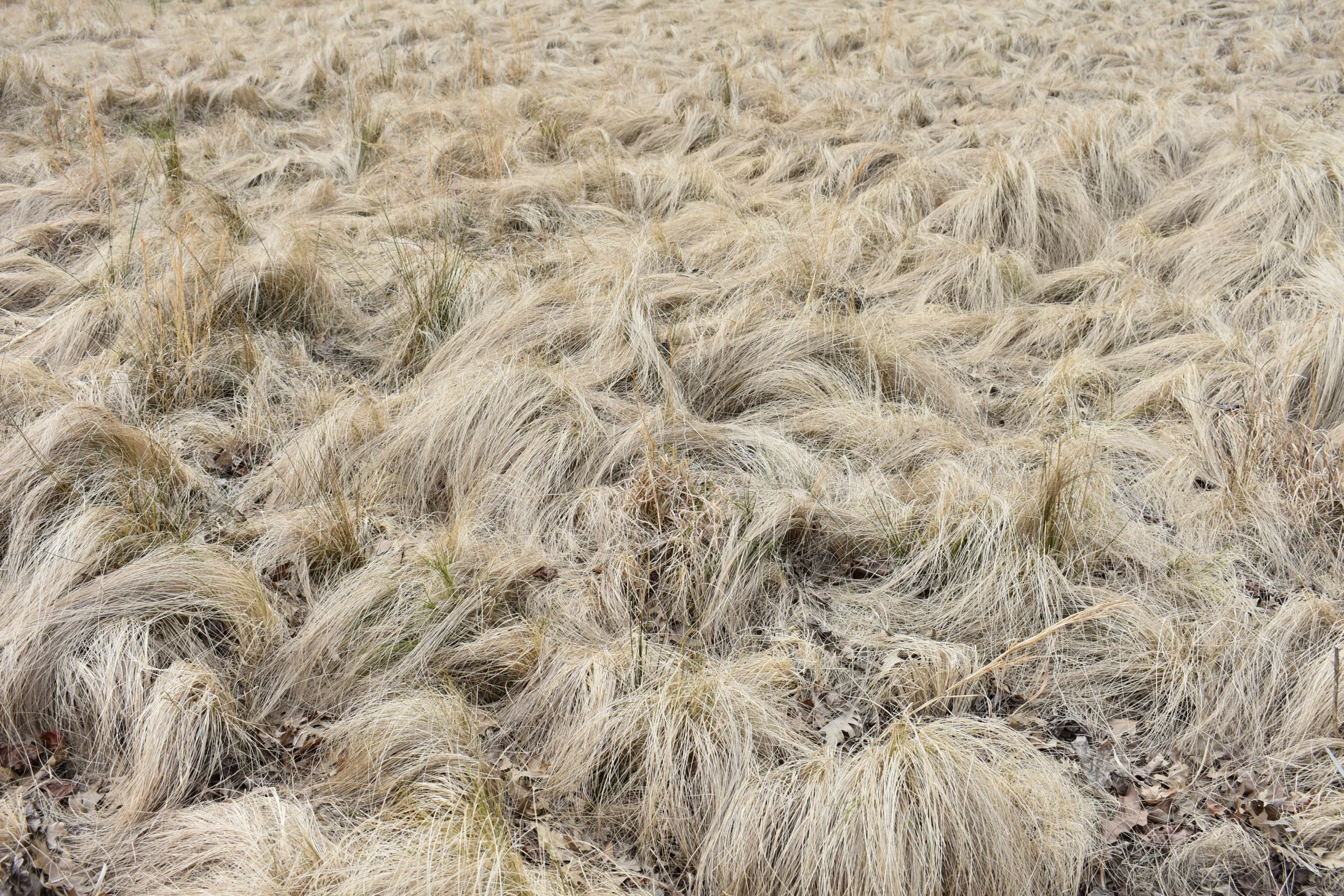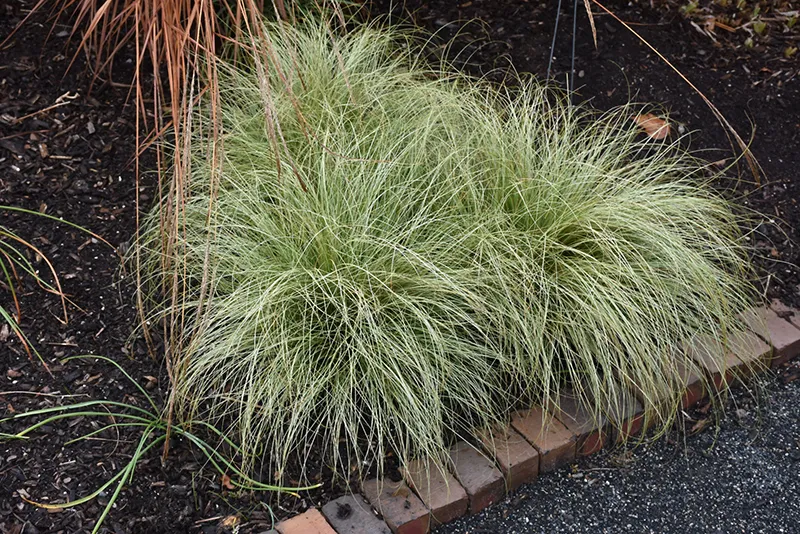Family: Sedge
Type: Ornamental Grass

Frosted Curls New Zealand Sedge, Carex comans ‘Frosted Curls’, is a captivating ornamental grass known for its fine, silvery-green foliage that gracefully arches and curls at the tips, resembling a fountain of delicate, frosty strands. This evergreen perennial adds texture, movement, and a touch of whimsy to any garden setting. It thrives in a variety of conditions, from full sun to partial shade, making it a versatile choice for gardeners looking to infuse their landscapes with its unique aesthetic appeal.
Reaching up to 2 feet in height and spread, Frosted Curls New Zealand Sedge is a low-maintenance plant that requires minimal care once established, making it an excellent option for adding year-round interest to garden beds, borders, and containers. Its drought tolerance and ability to adapt to different soil types further contribute to its popularity among both novice and experienced gardeners.
Incorporating Frosted Curls into landscaping brings a soft, airy texture that complements both bold and subtle garden designs. Whether used as a ground cover, in mass plantings, or as an accent in mixed borders, this sedge’s distinctive foliage and form make it a standout choice. Its visual appeal is enhanced when the light catches its frosted tips, creating a shimmering effect that adds depth and dimension to the garden.
Hardiness Zone: 5b-10b
Pet Friendly: Yes
Moisture Preference: Moist to wet
Sun Needs: Full sun to partial shade
Growth Rate: Medium
Average Height (feet): 1
Average Spread (feet): 1.5
Average Life Span (years): 10
Form: Mounded
Foliage Color: Green
Leaf Fall Color: Brown
Foliage Shape: Grassy
Incorporating Frosted Curls New Zealand Sedge into your garden design can create focal points, define spaces, and add a layer of visual interest with its unique texture and form. Planting it along pathways or borders offers a soft, natural edging that invites exploration and engagement. Its cascading habit and frosty appearance also make it a stunning choice for rock gardens or slopes, where it can mimic the flow of water or soften harsh lines.
Grouping Frosted Curls in clusters within perennial beds provides contrast against larger-leaved plants or brightly colored flowers, highlighting its delicate beauty. In urban or small-space gardens, this sedge thrives in containers, where its flowing form can be appreciated up close on patios, balconies, or terraces.
For a serene, cohesive landscape, consider using Frosted Curls as a unifying element throughout the garden. Its adaptability to various garden styles and settings, from informal cottage gardens to minimalist contemporary landscapes, showcases its versatility and charm. By integrating this sedge into different areas, you can create a sense of rhythm and harmony that ties the garden together.

In contemporary settings, Frosted Curls adds texture and movement without overwhelming the minimalist aesthetic, perfectly complementing modern design elements.
Its whimsical, flowing form integrates beautifully into the relaxed, informal style of cottage gardens, adding lightness and a sense of natural beauty.
For coastal gardens, Frosted Curls' tolerance for wind and salt spray, along with its ability to thrive in sandy soils, makes it an ideal choice for seaside landscapes.
Use Frosted Curls to soften hardscaping elements, planting it along the edges of walkways or retaining walls where its delicate foliage can spill over and create a gentle, inviting border.
Incorporate it into a sensory garden, where its tactile and visual qualities can be enjoyed. The soft, curling foliage invites touch, while its movement adds dynamism to the space.
Pair Frosted Curls with bold, architectural plants like succulents or broad-leaved perennials to create striking contrasts in texture and form, highlighting the unique characteristics of each plant.
Select our pre-made garden layouts to create a landscape that’s uniquely yours. Simple, smart, and customizable!
In spring, Frosted Curls begins to grow, adding fresh, vibrant greenery to the garden as it emerges from its winter dormancy.
Throughout the summer, its silvery-green foliage maintains its lush, curled appearance, providing a cool, soft texture among summer blooms.
As fall arrives, Frosted Curls continues to offer visual interest, with its evergreen foliage standing strong against the changing autumn landscape.
In winter, the sedge's frosted tips capture the light and frost beautifully, adding sparkle and life to the subdued winter garden.
Frosted Curls New Zealand Sedge flourishes in locations that receive full sun to partial shade, making it versatile for various garden spots.
It thrives under full sun but also adapts well to partial shade, where its unique foliage color and texture can still stand out.
This sedge prefers well-draining soil but is quite adaptable to different soil types, from sandy to loamy, as long as they are not waterlogged.
Space plants approximately 12-18 inches apart to allow for their mature spread and ensure they fill in the area nicely.
The best times to plant Frosted Curls New Zealand Sedge are in the spring or early fall, when temperatures are cooler and conducive to root development.
Dig a hole slightly larger than the root ball, place the plant ensuring it’s level with the surrounding soil, backfill, and water well to establish.
Initially, keep the soil evenly moist to help establish the plant. Once mature, Frosted Curls is relatively drought-tolerant but benefits from occasional watering during dry periods.
Apply a light layer of compost or a balanced, slow-release fertilizer in the spring to encourage healthy growth throughout the season.
Minimal pruning is needed. Remove any brown or damaged foliage in early spring to maintain its appearance and health.
Start the season by clearing any debris from around the plants and applying fertilizer to support new growth.
Ensure the plant receives adequate water, especially during prolonged dry spells, to keep it looking its best.
Reduce watering as the plant prepares for dormancy. Apply mulch to protect the roots in colder regions.
Frosted Curls New Zealand Sedge is generally low-maintenance in winter. In colder climates, the plant may benefit from a protective layer of mulch.
It grows at a moderate rate, establishing itself within a season and gradually filling in the space around it over a few years.
Yes, it’s well-suited for container gardening, adding texture and movement to patio or balcony displays.
No, it’s not considered invasive. While it will gently spread over time, it does so slowly and is easy to manage and contain within a designated area.
Sign up below to get exclusive deals, discounts, and new plant collections—delivered straight to your inbox! Plus, stay inspired with the latest gardening tips, landscaping trends, and DIY garden ideas. Start growing with us today!
A big thank you for subscribing to the PBN Design newsletter.
We're thrilled to have you join our community. Get ready for exciting updates, insightful content, and more delivered straight to your inbox.
Stay tuned!
Go backA big thank you for subscribing to the PBN Design newsletter.
We're thrilled to have you join our community. Get ready for exciting updates, insightful content, and more delivered straight to your inbox.
Stay tuned!
Go back